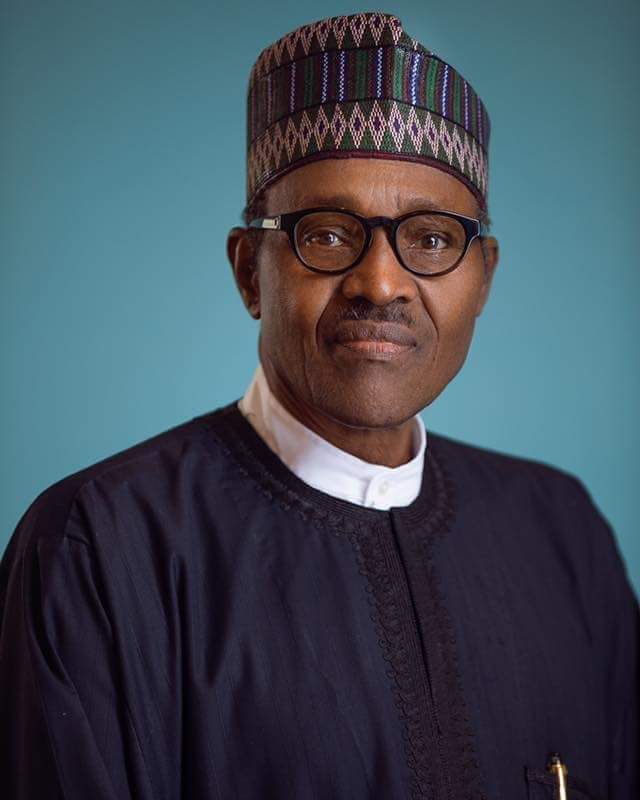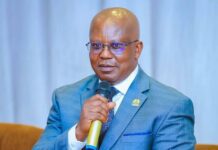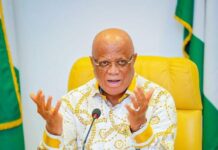As the world marks the Anti-corruption Day on Monday, attention will focus on the efforts of the Muhammadu Buhari-led administration in battling the monster. Under the administration, three past governors have been convicted for crimes committed in office, CHINAKA OKORO writes
Ex- governors under probe or on trial
1. Bukola Saraki (Kwara)
2. Ali Modu Sheriff (Borno)
3. Godswill Akpabio (Akwa Ibom)
4. Chimaroke Nnamani (Enugu)
5. Saminu Turaki (Jigawa)
6. Sule Lamido (Jigawa)
7. Ahmed Yerima (Zamfara)
8. Gabriel Suswam (Benue)
9. Martin Elechi (Ebonyi)
10. Danjuma Goje (Gombe)
11. Ikedi Ohakim (Imo)
12. Peter Odili (Rivers)
13. Murtala Nyako (Adamawa)
14. Boni Haruna (Adamawa)
15. Gbenga Daniel (Ogun)
16. Rashidi Ladoja (Oyo)
17. Adams Oshiomhole (Edo)
18. Abdulaziz Yari (Zamfara)
19. Rochas Okorocha (Imo)
20. James Bala Ngillari (Adamawa)
21. Akinwumi Ambode (Lagos)
22. Adebayo Alao-Akala (Oyo)
Convicted Ex- governors
1. Lucky Igbinedion (Edo)
2. James Ibori (Delta)
3. Jolly Nyame (Taraba)
4. Joshua Dariye (Plateau)
5. Orji Uzor Kalu (Abia)
•Ibori was convicted in the United Kingdom
•Igbinedion was convicted under the Goodluck Jonathan adminsitration
CONVICTIONS
2015 (103)
2016 (195)
2017 (190)
2018 (314)
2019 as at
September (834)
Total: 1, 636 convictions in four years
RECOVERIES IN NAIRA
N33,180,830.790 (2015)
N170,276,862,880 (2016)
N473,065,195.970 (2017)
N216,455,497.764 (2018) N46,534,536.954
(as at August 2019)
RECOVERIES IN USD ($)
$42,917,205(2015)
$69,142,551(2016)
$142,505,121(2017)
$47,290,174(2018)
$13,458,041 (2019)
RECOVERIES IN POUNDS (£)
£147,100(2015)
£44,785(2016)
£294,852(2017)
£873, 278 (2018)
£4,644,493 (2019)
RECOVERIES IN EURO
€832,237(2015)
€56,470(2016)
€7,247,364(2017)
€298,055(2018)
€53,025(2019)
Source: EFCC
President Muhammadu Buhari is billed on Monday to kick off the National Anti-Corruption Marathon Race in Abuja. Under the administration, three ex-governors, Orji Uzor Kalu (Abia), Jolly Nyame (Taraba) and Joshua Dariye (Plateau), have been jailed for offences committed while in office. Kalu was convicted yesterday and sentenced to 12 years in jail.
Buhari, at the outset of his administration, pointed out that ‘if we do not kill corruption, corruption will kill us’. This belief has defined his administration’s approach to the fight against corruption, which is waged through the Economic and Financial Crimes Commission (EFCC) and the Independent Corrupt Practices and other related offences Commission (ICPC).
The EFCC has recovered no less than N939.51billion in four years. About 1,636 convictions were also secured within the same period. Cash recovery between 2009 – 2019 is not less than N1.28 trillion.
Ibrahim Magu, who was appointed by Buhari on November 11, 2015 as EFCC acting chairman, is still awaiting confirmation of his appointment. He has spent four years in acting capacity.
The Senate is yet to get a letter from the President re-nominating Magu.
A fact-sheet from the commission reads: “Total cash recovery in naira reached N1.28 trillion between 2009 -2019 (August), out of which N939.51 billion or 73% was recovered between 2015 and 2019 (August).
“The recoveries (Naira equivalent) in the last four years under Magu are: N33,180,830.790(2015); N170, 276,862,880(2016); N473,065,195.970(2017); N216,455,497.764(2018); and N46,534,536.954 (as at August 2019).
“In terms of the United States dollars, the EFCC made the following recoveries in the last four years: $42,917,205(2015); $69,142,551(2016); $142,505,121(2017); $47,290,174(2018); and $13,458,041.
“Others cash in pounds included £147,100(2015); £44,785(2016); £294,852(2017); £873, 278 (2018); and £4,644,493(So far in 2019).
“For the recoveries in Euro since 2015, the breakdown reads, €832,237(2015); €56,470(2016); €7,247,364(2017); €298,055(2018); and €53,025(2019).
“It is instructive to state that the EFCC also recorded landmark achievements between January and September, 2019. For example, the commission recovered N63.73billion, $14.04million, £4.65million, €53,325, 2,800 Yen, 294,950 Riyal, 15,200 CAD$ and 36,000 CFA.”
The document also indicated that the EFCC “secured 1, 636 convictions in four years including 2015(103); 2016(195); 2017(190); 2018(314); and 2019(834) as at September.
“EFCC’s recoveries are the highest recorded by any anti-graft agency ever in the history of Nigeria’s war against corruption.
” About 407mansions were seized, out of which 126 have been finally forfeited while 281 are under interim forfeiture. Nine gas stations were seized and placed under interim forfeiture. Parcels of land seized sums up to 98, out of which 56 are under interim forfeiture, while 42 have been forfeited finally to the federal government.
“About 95 per cent of all recoveries in Nigeria is through the EFCC following court orders which granted interim or final forfeiture of looted funds and illegally acquired properties.
Orji Kalu
“The EFCC in collaboration with agencies of government such as the Asset Management Corporation of Nigeria, AMCON, the Federal Inland Revenue Service, FIRS, and the Nigerian National Petroleum Corporation, NNPC, in the last three years is actively helping to recover otherwise toxic assets and tax liabilities. Funds worth over N35billion was recovered on behalf of the FIRS, over N4billion recovered for AMCON and over N328billion recovered for NNPC in Kano State, Northwest Nigeria.”
The UN Anti-corruption Day
Mindful of the destructive impact of corruption, the United Nations (UN) voted a day to observe and fight the monster.
By resolution 58/4 of October 31, 2003, the UN General Assembly designated December 9 as International Anti-Corruption Day. The resolution was aimed at sensitising people to the dangers of corruption.
To strengthen the anti-graft war globally, the General Assembly encouraged member states and competent regional economic integration organisations to sign and ratify the United Nations Convention against Corruption (UNCAC); which is the first legally-binding international anti-corruption instrument that provides opportunity to mount a global response to sleaze.
Experts posit that “corruption as a political, economic and social phenomenon threatens and undermines democratic institutions; contributes to governmental instability and slows down economic development.”
To underscore how debilitating corruption could be, the UN Secretary-General, António Guterres described it thus: “Corruption begets more corruption and fosters a corrosive culture of impunity.”
Corruption as deformity of the mind
Corrupt tendencies are functions of the mind. Crimes are hatched in the mind before they manifest physically. If the mind constantly breeds evil, corruption will multiply. This leads us to ask what constitutes corruption. Does corruption manifest only when money exchanges hands? This is a terrible perception. It is a matter of how refined, tacky or bestial one’s mind is.
Jolly Nyame
Beyond financial inducement
Contrary to erroneous belief that corruption takes place only when money exchanges hand, Mr. Victor Ibiloye, a banker described corruption as “any act that leads to the destruction of one’s honesty or loyalty through undermining moral integrity or acting in a way that shows a lack of integrity or honesty. It also refers to those who use their position of authority or trust for dishonest gain.”
He added: “Corruption is a multifaceted phenomenon. The searchlight should be beamed on people’s attitudes; whether their attitudes are in contradiction to the well-being of their fellow humankind or against the progress of the state. It should not be limited to monetary or financial inducement as we currently experience.”
Where the rain started drenching us
During the First Republic, corruption was not pervasive. Mrs Jennifer Ugomma Iheanacho, a commentator on public affairs, attributed the trend to the rise of public administration and the discovery of oil and natural gas as two major events believed to have led to the sustained increase in the incidence of corrupt practices.
“Though efforts have been made by successive administrations to minimise corruption through the enactment of laws and the enforcement of integrity systems with little success, greed, ostentatious lifestyle, customs and people’s attitudes are believed to have led to corruption,” she said.
Statistics indicates that in 2012, Nigeria was estimated to have lost over 400 billion dollars to corruption since independence. In 2018, the country ranked 144th in the 180 countries listed in Transparency International’s Corruption Index (with Somalia at 180th, being the most corrupt, and Denmark the least corrupt country in the world).
















